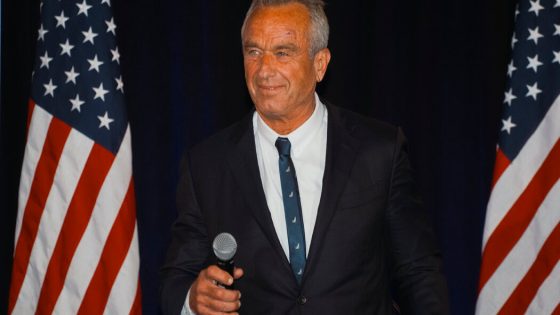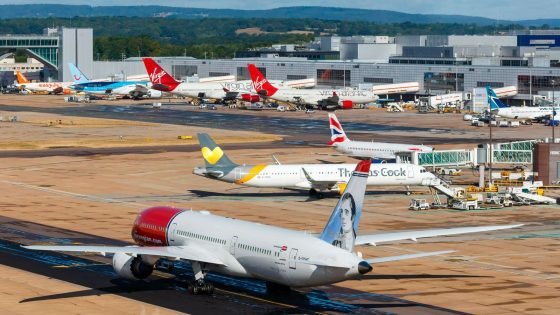Robert F. Kennedy Jr., the independent candidate for president, pitched his bid to the Libertarian Party on Friday, telling a potentially critical group of voters that he stands with them on “valuing personal liberty” and vowing to protect their rights to speak, to assemble and to “keep and bear arms.”
In a speech that was as much a lecture on constitutional law as it was a political appeal, Mr. Kennedy, a former Democrat and environmental lawyer, railed against government overreach to a largely receptive audience of fellow government skeptics. He slammed what he called a “program of coercion, and information control” during the Covid pandemic, accusing President Biden and former President Donald J. Trump of failing to protect liberties.
Mr. Kennedy spoke as the party met to select its presidential nominee, a prize that will land the winner on ballots in at least 37 states. Mr. Kennedy has fitfully courted the nomination for months, as he undertakes the expensive and complex process of qualifying as an independent. But he recently said he did not intend to run as a Libertarian, and several party leaders and delegates say it is unlikely he will win the nod when the delegates vote this weekend.
Mr. Kennedy was not the only non-Libertarian presidential candidate on the convention lineup: Former President Donald J. Trump is set to address the group on Saturday night.
The attention to an often-overlooked minor party underscored the tug of war over right-leaning, independent-minded voters. In a race likely to be decided by narrow margins, Mr. Trump cannot afford to lose any votes. And Mr. Kennedy, with his anti-establishment message and zigzagging ideology, has been veering into Mr. Trump’s lane.
Recent polls suggest that Mr. Kennedy could draw support away from both Mr. Trump and President Biden in a general election. He is polling at around 10 percent of registered voters across battleground states, recent polls from The New York Times, Siena College and The Philadelphia Inquirer show.
Mr. Kennedy currently has access to ballots in only six states, including Michigan, a critical swing state. His campaign says he has enough signatures to appear on more.
The Libertarian Party is one of the more established minor political parties. In addition to ballot access — the party’s leaders say they expect to be on the ballot in 48 states by November — it has name recognition and national organization. In 2020, the Libertarian candidate, Jo Jorgensen, won 1.2 percent of the national presidential vote, including about 51,000 votes in Arizona, a state Mr. Trump lost by around 10,500 votes.
Libertarian voters tend to lean to the right on fiscal issues — opposing taxes and government spending on defense, social services and the regulatory state — but to the left on social issues, such as legalizing drugs and sex work, and limiting government involvement in health and private life.
Many of Mr. Kennedy’s positions are at odds with the party’s platform, particularly in the area of government oversight. He has called for increased regulation of the environment and increased criminal and civil liability for polluters. He recently said he would prohibit pharmaceutical companies from advertising on television.
But he has also argued for an end to overseas military engagements, pushed back against public health mandates, including vaccines and Covid-era social distancing, and — perhaps most critically — injected new energy into a push against the two-party system.
In his speech Friday, Mr. Kennedy drew the most applause, and a standing ovation, for his pledge to pardon Edward Snowden, who as a government contractor leaked classified documents about surveillance programs, and to drop federal espionage charges against the WikiLeaks founder Julian Assange on his first day in office.
“Assange should be celebrated as a hero for doing exactly what journalists are supposed to do, which is exposing government corruption,” he said, adding that there should be a monument to him in Washington, and to Mr. Snowden.
Mr. Kennedy also got rousing applause for his pledge “not to take away anyone’s guns,” and his support for gun ownership. “The only amendment that did not come under attack during the Covid pandemic was the Second Amendment,” he said. “And many Americans believe that the reason for that is because we have a Second Amendment.”
Party activists on Friday morning expressed skepticism about Mr. Kennedy and Mr. Trump’s appearances, which were seen by party leadership as a play for media attention — particularly in the case of Mr. Trump, who many rank-and-file Libertarians distrust, party leaders and delegates have said.
“I don’t want him here, he’s not going to sway my vote,” said Richard Longstreth, an alternate delegate from Tennessee. “We are the Libertarian Party. We should have Libertarian candidates speaking at our convention.” He described Mr. Kennedy and Mr. Trump as “diluting the message” of the party.
Lars Mapstead, one of the party’s candidates for the nomination, said he hoped the convention would help Libertarians define their message.
“We align with people in all areas of the country, on different issues,” Mr. Mapstead said. What unites the party across the “left-right” spectrum, he said, is an anti-authoritarianism: “They all want to reduce the state. They all think we have too much government.”
Mr. Trump, he said, is persona non grata: “We reject everything about him.” Mr. Mapstead said he had been in touch with the Kennedy campaign about electoral strategies.
The convention is also where the party shapes its platform and leadership, an effort already underway Friday with contentious and boisterous floor votes and procedural motions that elicited roaring boos in a subterranean ballroom.
A late night party on Friday, called the “Enemy of the State Dance Party,” will help delegates blow off steam, several people said. The D.J., reportedly, is a founding member of the party’s “Emo Caucus,” whose press materials bore the motto “Live Free or Cry.”
Source Agencies




